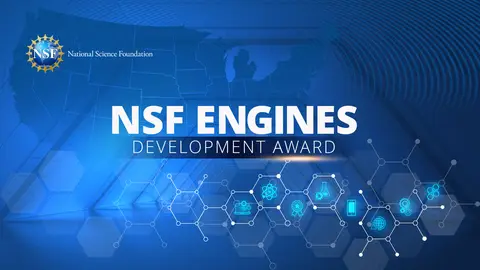Multi-institutional collaboration will use ‘Ecotech’ to help coastal communities
RESEARCH TRIANGLE PARK, N.C. — The North Carolina Ecosystem Technology project has been awarded $1 million from the U.S. National Science Foundation's Regional Innovation Engines, or NSF Engines, program to develop an economic engine that could rapidly improve the quality of life in rural coastal communities using ecosystem technology, or ecotech, an emerging branch of applied science.
NCET is among more than 40 unique teams to receive one of the first-ever NSF Engines Development Awards, which aim to create economic, societal and technological opportunities in their regions. The NCET team consists of 11 principal investigators who are experts across disciplines from seven institutions: the University of North Carolina Wilmington, Cape Fear Community College, Carteret Community College, Duke University, East Carolina University, North Carolina Agricultural and Technical State University and RTI International. Using the coastal city of Wilmington as its hub, NCET will focus on three key areas: coastal infrastructure, aquaculture and renewable energy ancillary services.
The NSF Engines program is a transformational investment for the nation, ensuring the U.S. remains in the vanguard of competitiveness for decades to come.
“These NSF Engines Development Awards lay the foundation for emerging hubs of innovation and potential future NSF Engines,” said NSF Director Sethuraman Panchanathan. “These awardees are part of the fabric of NSF's vision to create opportunities everywhere and enable innovation anywhere. They will build robust regional partnerships rooted in scientific and technological innovation in every part of our nation. Through these planning awards, NSF is seeding the future for in-place innovation in communities and to grow their regional economies through research and partnerships. This will unleash ideas, talent, pathways and resources to create vibrant innovation ecosystems all across our nation.”
More specifically, the NCET developing engine will improve the infrastructure of the NC coastal region and solve problems.
“NCET focuses on using ecosystem technologies to help all communities of Eastern North Carolina thrive by developing an academic-business-local government partnership to drive innovation and use-inspired solutions to climate-related and other societal issues that will continue to impact the region,” said Dr. Ken Halanych, executive director of UNCW’s Center for Marine Science and lead PI on the project.
According to Dr. Halanych, NCET has the potential to turn North Carolina into a national, and eventually, global hub of ecotech innovation that will integrate economic, community and ecological sustainability. Moreover, innovation engines such as NCET have the potential to create quality jobs for people living and working in the region, seeding opportunities of innovation-driven economies more fully in Eastern North Carolina, explains Sara Lawrence, director of economic development at RTI International. Currently, NCET has nearly 40 supporting partners from a variety of sectors statewide.
Within the three key areas, five emerging subfields of focus include:
- engineering with nature
- environmental sensing and signaling
- ecosystem-inspired materials
- ecosystem genetic engineering
- ecosystem service measuring and modeling.
Some examples of innovative research and development in these key areas include:
- 3D printing living shoreline implants
- designing green roofs to harness energy for heating and cooling buildings
- automating deployable drones that can measure storm aftermath and flood surges
- using genomic tools to improve aquaculture
- developing pharmaceuticals using marine toxins and chemicals with antibacterial properties.
The NSF Engines Development awardees span a broad range of states and regions, reaching geographic areas that have not fully benefited from the technology boom of the past decades. These awards will help organizations create connections and develop their local innovation ecosystems within two years to prepare strong proposals for becoming future NSF Engines, which will each have the opportunity to receive up to $160 million.
View a map of the NSF Engines Development Awards
Learn more about the NSF Engines program
Learn more about RTI’s capabilities in innovation for economic growth
About the NSF Engines Program
Launched by NSF's new Directorate for Technology, Innovation and Partnerships and authorized by the "CHIPS and Science Act of 2022," the NSF Engines program uniquely harnesses the nation's science and technology research and development enterprise and regional-level resources. NSF Engines aspire to catalyze robust partnerships to positively impact regional economies, accelerate technology development, address societal challenges, advance national competitiveness and create local, high-wage jobs. Learn more on the NSF Engines website.
About UNCW
UNC Wilmington, the state’s coastal university, is dedicated to the integration of teaching and mentoring with research and service. The university, celebrating its 75th anniversary in 2022-23, serves nearly 18,000 students and offers a full range of undergraduate and graduate-level programs, as well as select doctoral programs that address state needs. Recognized for its strong commitment to community and economic engagement, UNCW earned the national designation of “Innovative and Economic Prosperity University” (IEP) by the Association of Public and Land-grant Universities in 2022. The designation acknowledges public research universities working with public and private sector partners in their states and regions to support economic growth and vitality. Learn more at uncw.edu.
About RTI International
RTI International is an independent, nonprofit research institute dedicated to improving the human condition. Clients rely on us to answer questions that demand an objective and multidisciplinary approach — one that integrates expertise across the social and laboratory sciences, engineering and international development. We believe in the promise of science, and we are inspired every day to deliver on that promise for the good of people, communities and businesses around the world. For more information, visit www.rti.org.

RTI International Media Relations:
As an independent, scientific research institute with a mission to improve the human condition, RTI International is engaged by clients and partners to conduct evidence-based research and project implementation. We share our work in line with journalistic and scientific standards and maintain a record in RTI’s Newsroom.
RTI International is an independent scientific research institute dedicated to improving the human condition. Our vision is to address the world's most critical problems with technical and science-based solutions in pursuit of a better future. Clients rely on us to answer questions that demand an objective and multidisciplinary approach—one that integrates expertise across social, statistical, data, and laboratory sciences, engineering, and other technical disciplines to solve the world’s most challenging problems.
For more information, visit www.rti.org.

